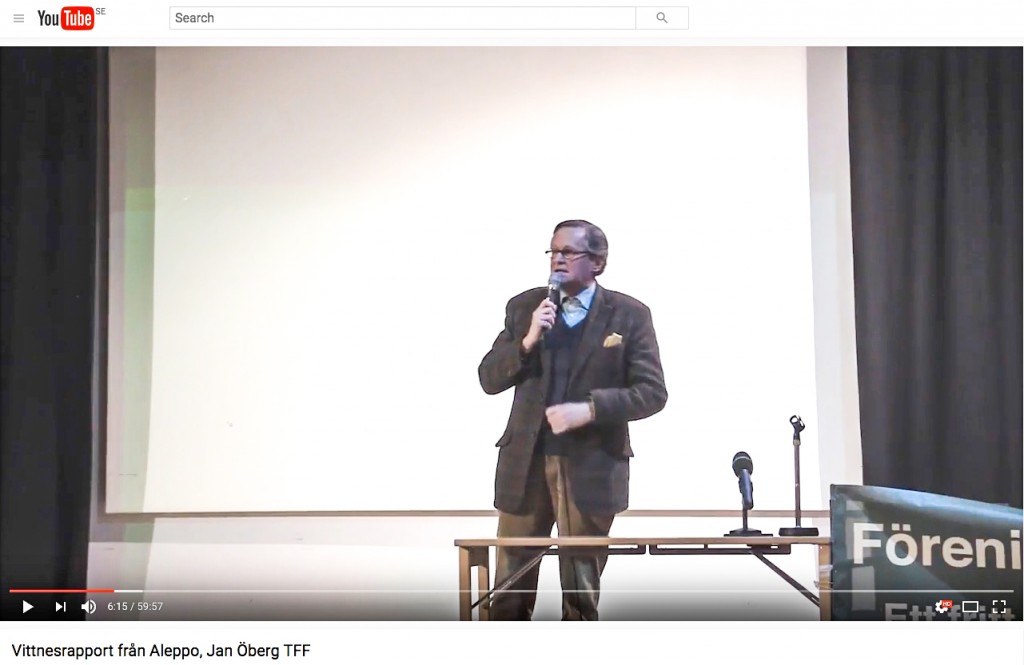Archive for March, 2017
Vittnesrapport från Aleppo, en annorlunda konfliktanalys och vägar till fred i Syrien
Videoinspelning av Jan Öbergs föredrag i Stockholm februari 2017
Inspelningen är uppdelad i två delar:
Del 1: Vittnesrapport från Aleppo
60 min.
Del 2: Debatt och vägar till fred i Syrien
45 min.
Bakgrund
10-14:e december 2016 vistades Jan Öberg i Aleppo. Med sin unika erfarenhet från staden ifrågasätter han den gängse massmediarapporteringen, argumenterar för ett nytt sätt att se på konflikter på och ger förslag till den nödvändiga fredsprocessen.
Moderator
Anders Björnsson, författare
Datum
Lördag 25 februari kl. 14-16, Bagarmossens Folkets Hus, Stockholm
Arrangörer
Föreningen Syriensolidaritet, Folket i Bild Kulturfront – Stockholmsavdelningen, FiB-juristerna m.fl.
Jan Öberg rapporterar
– Jag kunde fritt tala med vem jag ville, och fotografera som jag ville. Jag gick omkring utan säkerhet, polis eller annat skydd. Många tackade mig för att jag var i Aleppo vid befrielsen.
– Förstörelsen av Aleppo är värre än jag någonsin trott – efter att ha sett Sarajevo, Mostar och Vukovar. Den stora förstörelsen är från gatustriderna – en mindre del ifrån luften.
– Ingen av dem många jag pratade med hade sett de Vita Hjälmarna. Däremot träffade jag frivilliga från Syriens Röda Halvmåne som var mycket professionella.
– De jag pratade med uttryckte sin glädje över frihet efter fyra års belägring och uttryckte tacksamhet över regeringens och ryssarnas insatser.
Öbergs fotoberättelser
Se också Jan Öbergs fotoserier med bakgrunds- och förklarande text här.
TFF PressInfo och andra artiklar – av vilka många handlar om Syrien – finns på TFF:s blogg här.
History: Epochs or Trends – Medieval Spain
By Johan Galtung
Visions of the Past for Constructing a Future: Historiography of Spain
The distinction made by Fernand Braudel between events, trends and permanents, was a gift to historiography, how we conceive of history. This essay favors trends over epochs, seeing epochs as some kind of static racism or prejudice in time–“those people, at that epoch, were like that”, blinding us both to the diversity and to the dynamism.
History unfolds over or in time, the basic variable, the X axis. The events are points. The trends are curves of any shape, not necessarily continuous, could also be “jumpy”. And the permanents are horizontal lines set at a certain value.
Points, curves, lines – with texts indicative of highly complex proactio-actio-reactio relations.
History is the totality. However, trends accommodate the others. Trends are initiated or terminated by events. Trends may together generate events. Permanence is also a trend; lines are also curves.
Trends were identified for an epoch in time, Middle Ages, and a region in space, Spain. Read the rest of this entry »
Immigration: To be or not to be
By Jonathan Power
February 28th 2017
The great immigration debate has to become the great re-thinking and re-structuring debate. Charlie Brown is right when he says, “No problem is too big and complicated that it can’t be run away from”.
In both the US and the EU the focus is increasingly on the problem of immigration. President Donald Trump talks of them being criminals, drug traffickers and scroungers. And then he wants to build a very expensive wall on the border separating countries that for a long time have not countenanced war or terrorism against each other. (By the way, there is a funny Mexican joke: “Yes, it’s a good idea to build the wall- it will keep Trump out”!)
There are good reasons for allowing low-skilled immigrants in. (In this column I use the word “immigrants” to include refugees.) Shika Dalmir has given some good reasons why this should be so:
1) Americans are the customers of low-skilled immigrants, buying services from them, everything from hospital cleaning to childcare to repairs to the house.
2) These immigrants are mobile since they rent rather than own. So they can move to where the work is. Right now they are being encouraged to move to Detroit where much of population has fled the city’s decay and the mayor is trying to revitalise it.
3) They are good for American and European women. Often nannies, they enable many women to work. Many of these are high-skilled and therefore contribute a good deal to society.
4) Immigrants cost the state less than ordinary workers. They often don’t qualify for benefits. Of course they cost the state when it comes to schooling or medical care. But then they pay taxes (unless they are illegals). Read the rest of this entry »


